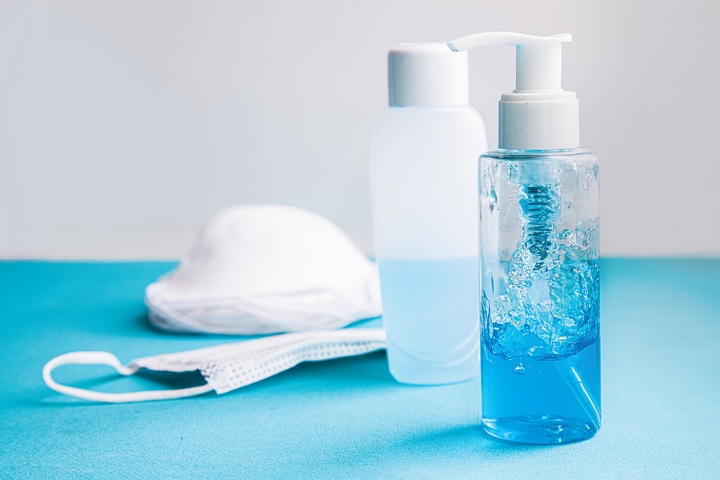Hand sanitizer has been widely used for a long time, especially in places where at-risk individuals live or stay, such as care homes and hospitals. However recently we have seen a spike in popularity for the product, due to the global COVID-19 pandemic. And that’s a great thing – hand sanitizer offers a lot of solid benefits. That said, there are some drawbacks to the sudden surge in hand sanitization.
Here are the different pros and cons of hand sanitizer usage:
Pro: Hand sanitizer is a portable solution

One of the best benefits of using hand sanitizer is that it offers immediate and efficient cleanliness anywhere. This is especially beneficial when you’re on the go, and don’t have access to a sink. It’s small, light, and you don’t need very much of it to get the desired effect. You can also order large volumes of hand sanitizer in bulk quantities, making this a very accessible resource.
Pro: Hand sanitizer protects yourself and others

There are studies that show a direct correlation between individuals and families who actively use hand sanitizer, and those that don’t. Users of hand sanitizer tend to be healthier, and are actively stopping the spread of illness – especially gastrointestinal illnesses – dead in their tracks.
As such, hand sanitizer is a great way to be part of the solution, rather than the problem, when it comes to slowing and stopping the spread of contagious illnesses.
Pro: Hand sanitizers can be used quickly

Hand sanitizer doesn’t mess around – it works quickly. When used correctly – that is, the appropriate amount (dime-sized) rubbed carefully into every area of the hands – it is a fast-acting bacteria and virus killer. When necessary, it is a fairly reliable tool for protecting yourself and others against harmful bacteria.
Pro: Most hand sanitizers are effective

Not all hand sanitizers are equally as effective. If the sanitizer is made of less than 60 per cent alcohol, it is not doing its job well enough. If you are looking for a hand sanitizer, be sure to select one with 60 per cent alcohol content or more, so that you are achieving sufficient sanitization. Anything else is quite frankly a waste of your money and is more of a false sense of security than an effective sanitizer.
Con: Hand sanitizers may have effects on the skin

This is somewhere between a pro and a con. Most of today’s hand sanitizers are created with a moisturizer mixed in, so as not to cause as much damage to your hands. However, the alcohol in hand sanitizer is very drying, and even with the moisturizer it can cause dry skin, itchiness and irritation. So, if you’re planning to use it fairly regularly, be sure to find one that focuses on moisturizing in addition to sanitizing.
Con: Hand sanitizer are less effective on extra dirty hands

If there is visible debris on the hands, such as food or dirt, hand sanitizers are not going to do the trick. The sanitizer is really for the invisible bacteria and viruses that are on our hands, and do not completely replace the need for washing with soap and water. This is one of the limitations of hand sanitizer that people may not realize, and is one way in which individuals may not be using it correctly.
In fact, hand sanitizer was originally created as a post-washing solution – something to assist in destroying additional bacteria after the hands had already been washed. Although it does do the trick on its own, it is ideal to wash your hands before using it, especially if there is visible debris.
Con: Hand sanitizers might not be more effective than soap

Although hand sanitizer is a great thing to keep around, studies show that it is just not quite as effective as the classic soap and water combination. If possible, try to always head for a sink with a good antimicrobial soap, but when that’s not possible, it’s okay to rely on hand sanitizer too.
Con: Your hands might create resistance to the hand sanitizer

It is unconfirmed, although suspected, that hand sanitizer could help to create antibiotic-resistant bacteria. This is because the bacteria is given the opportunity to evolve due to daily frequent hand sanitizer use, which effectively makes the bacteria stronger and less resistant to antibiotics. When it comes to hand sanitizer, it’s best to moderate its use, just in case, or until further studies can be done to prove or disprove this theory.
The final word
Just as with anything, there are both benefits and drawbacks to using hand sanitizer. This means that your reliance on it should fall somewhere in between never and always. Do keep hand sanitizer available and on hand, and do use it when necessary. Namely, in public places where there are many people touching the same handles, railings, and other such things as you are.
This is especially important in spaces, like public transit, where soap and water are not available. However, don’t rely on hand sanitizer as the only way to clean your hands. Whenever possible, use soap and warm water, and complete the correct steps for an efficient hand wash.











